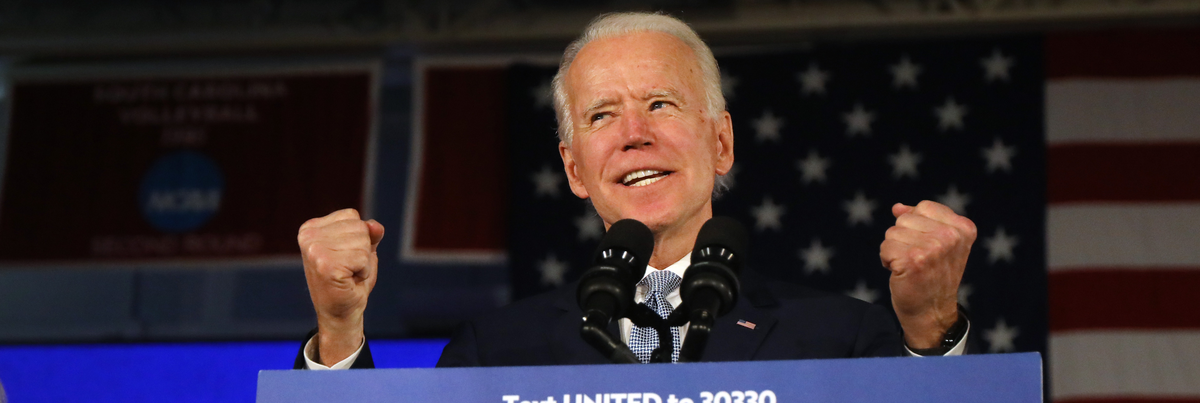Former Vice President Joe Biden carried four of the six states that voted Tuesday (with two of the races not called as of this writing), stretching his delegate lead over Vermont Senator Bernie Sanders. The latest Economist/YouGov Poll, conducted before the results of those primaries were known) finds Democratic primary voters support of Biden surging: a majority (53%) say they support Biden, and he has a 15-point lead nationally.
The Democratic voting pattern in the primaries is shown in the national results. Younger voters give Sanders the edge; older ones support Biden. The former vice president leads among men and women, as well as with white and black Americans. White Americans give Biden a seven-point edge, while his 50-point margin with African-Americans is more than three times the vote for Sanders.
The West makes for Sanders’ strongest region, as indicated by his victory in California. In this poll, Sanders holds a five-point lead there. Biden is ahead everywhere else.
Biden holds a small lead with liberal Democrats, and a much larger one with moderates; Independents who plan to vote (or have voted) in the Democratic primary favor Sanders (52% to 35%). Those who say Elizabeth Warren was their ideal candidate divide closely between the two, but slightly more go to Biden (46%) than Sanders (38%).
Democratic voters – and the country as a whole – have ceded the Democratic contest to Biden. By more than three to one (59% to 17%) the public believes Biden will be the nominee; Democratic primary voters say he will be the victor by an even wider margin (75% to 18%). Nearly half the Sanders voters (48%) believe Biden will become the party’s nominee.
The two men receive similar evaluations from Democratic voters and the public overall: their favorable ratings are generally the same. However, those supporting Sanders are divided about Biden: about half (48%) of them have a favorable opinion of the former Vice President, while the same percentage (48%) do not.
Two-thirds of Democratic primary voters find each man honest and trustworthy; Sanders has a slight edge over Biden when it comes to caring (half of Democratic primary voters believe he cares a great deal about their needs and problems; 42% think that about Biden (three in four say each man cares at least somewhat).
Biden has an edge on the perception of how the candidates would handle international crises. Among Democratic voters, 69 percent say they are confident in Biden’s ability to handle crises; fewer, 51 percent, are confident in Sanders’ ability to do that.
Both candidates are in their late 70s (President Donald Trump is also a septuagenarian). Most of each candidate’s Democratic supporters agree that age and health would have a little (but not a lot of) impact on how each candidate would do the job of President. More than six in 10 Republicans, however, claim that the President’s age and health would have no impact on his ability to be President.
For a primary election that has focused on the electability of the Democratic candidates, Biden and Sanders fare equally well against President Trump – at least for now.
There are some political group differences at this very early stage. At the moment, just 76 percent of Sanders voters say they would vote for Biden if he were the nominee against Trump (8% would vote for the President in that circumstance; the rest are unsure or would vote for someone else or not vote). Even in a race between Trump and Sanders, 5 percent of Sanders supporters say they would vote for the President.
More than four in five (84%) Biden voters say they would vote for Sanders if he became the nominee (4% would support Trump). 3% would defect in a Biden-Trump race.
Related: A growing number of Americans want stronger action against coronavirus—and conspiracies are abound
See the full toplines and crosstabs from The Economist/YouGov poll here
Image: Getty











